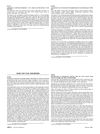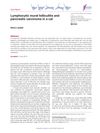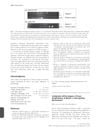 2 citations,
February 2009 in “Journal of Evidence-Based Medicine”
2 citations,
February 2009 in “Journal of Evidence-Based Medicine” No treatment showed significant long-term hair growth benefits for alopecia areata.
 5 citations,
November 2011 in “Expert Review of Dermatology”
5 citations,
November 2011 in “Expert Review of Dermatology” The document concludes that early diagnosis and a comprehensive treatment plan are crucial for managing hair loss in children, with a focus on both medical and psychological support.

The document provides 70 multiple choice questions to improve haematology skills.

The document tests knowledge and decision-making in hematology through multiple-choice questions.
 218 citations,
January 2013 in “The Lancet Oncology”
218 citations,
January 2013 in “The Lancet Oncology” Chemotherapy causes hair loss by damaging hair follicles and stem cells, with more research needed for prevention and treatment.
 86 citations,
July 2012 in “British journal of dermatology/British journal of dermatology, Supplement”
86 citations,
July 2012 in “British journal of dermatology/British journal of dermatology, Supplement” There may be a connection between Frontal Fibrosing Alopecia and Lichen Planus Pigmentosus, and more research is needed to confirm this.
 1 citations,
March 2020 in “Australasian Journal of Dermatology”
1 citations,
March 2020 in “Australasian Journal of Dermatology” The paper concludes that recognizing bitemporal alopecia areata is important for early treatment and preventing its progression.
 May 2014 in “Clinical and Experimental Dermatology”
May 2014 in “Clinical and Experimental Dermatology” A 70-year-old woman with a rare skin condition improved after treatment with topical steroids and acitretin.
 January 2007 in “Journal of the American Academy of Dermatology”
January 2007 in “Journal of the American Academy of Dermatology” A 73-year-old man's grey-white hair turned dark brown after eczema treatment.
 9 citations,
November 2014 in “Journal of feline medicine and surgery”
9 citations,
November 2014 in “Journal of feline medicine and surgery” Lymphocytic mural folliculitis in cats might be an early sign of pancreatic cancer.
3 citations,
May 2002 in “PubMed” The document concludes that treatment for excessive hair growth depends on the cause, with options including hair removal methods and medications like anti-androgens or insulin-sensitizing drugs.
 1 citations,
August 2005 in “British Journal of Dermatology”
1 citations,
August 2005 in “British Journal of Dermatology” Accidentally eating a topical steroid may rarely cause acute generalized pustular psoriasis.
 9 citations,
July 2010 in “British Journal of Dermatology”
9 citations,
July 2010 in “British Journal of Dermatology” The document suggests a rare skin condition might be caused by a genetic phenomenon.
 1 citations,
January 2015 in “Springer eBooks”
1 citations,
January 2015 in “Springer eBooks” The document says a skin condition called alopecia areata causes hair loss and stress, and is treated with strong skin creams, injections, or other therapies, but treatment success varies.
 26 citations,
March 2015 in “American journal of clinical dermatology”
26 citations,
March 2015 in “American journal of clinical dermatology” Topical clobetasol is recommended over mycophenolate mofetil for treating Lichen Planopilaris due to better safety and patient satisfaction.
 14 citations,
August 2019 in “Clinical and Experimental Dermatology”
14 citations,
August 2019 in “Clinical and Experimental Dermatology” Combining light therapy, acid, and microneedling improves hair regrowth in stubborn hair loss cases.
 12 citations,
January 2012 in “Dermatology”
12 citations,
January 2012 in “Dermatology” Finasteride helped treat a 28-year-old's facial skin condition.
 7 citations,
June 2019 in “Australasian Journal of Dermatology”
7 citations,
June 2019 in “Australasian Journal of Dermatology” Elderly men with a scalp condition healed in about 26 days using specific creams and dressings, with no return of the condition in 6 months.
 June 2024 in “British Journal of Dermatology”
June 2024 in “British Journal of Dermatology” Vitamin B supplements may reverse grey hair.
 July 2022 in “Singapore Medical Journal”
July 2022 in “Singapore Medical Journal” Most children with alopecia areata improved with treatment, but those with more hair loss had worse outcomes.
 198 citations,
October 2011 in “Journal der Deutschen Dermatologischen Gesellschaft”
198 citations,
October 2011 in “Journal der Deutschen Dermatologischen Gesellschaft” Use minoxidil for hair loss; finasteride and dutasteride for men, dutasteride for women.
 160 citations,
January 2009 in “Clinical Drug Investigation”
160 citations,
January 2009 in “Clinical Drug Investigation” HairMax LaserComb® effectively promotes hair growth and stops hair loss in males with androgenetic alopecia, with no serious side effects.
 145 citations,
November 2017 in “Journal of The European Academy of Dermatology and Venereology”
145 citations,
November 2017 in “Journal of The European Academy of Dermatology and Venereology” Use minoxidil for hair loss treatment; assess results after 6 months.
 130 citations,
August 2020 in “Drug Design Development and Therapy”
130 citations,
August 2020 in “Drug Design Development and Therapy” Nanoparticles can improve skin drug delivery but have challenges like toxicity and stability that need more research.
 114 citations,
January 2007 in “Drug Safety”
114 citations,
January 2007 in “Drug Safety” Some drugs can cause skin, nail, and hair problems, which are important for healthcare professionals to recognize and report.
 101 citations,
July 2020 in “Dermatologic therapy”
101 citations,
July 2020 in “Dermatologic therapy” COVID-19 can cause skin issues like rashes and "COVID toes," and people with skin conditions should adjust their treatments if they get the virus.
 99 citations,
July 2017 in “Clinical Reviews in Allergy & Immunology”
99 citations,
July 2017 in “Clinical Reviews in Allergy & Immunology” New treatments for Alopecia Areata show promise but need to be more effective and affordable.
 99 citations,
December 2010 in “Journal of The European Academy of Dermatology and Venereology”
99 citations,
December 2010 in “Journal of The European Academy of Dermatology and Venereology” The document concludes that certain genetic mutations and dietary factors are involved in acne development, and treatments like isotretinoin and diet changes can help manage it.
 98 citations,
December 2008 in “Journal of Investigative Dermatology”
98 citations,
December 2008 in “Journal of Investigative Dermatology” Prolactin affects hair growth and skin conditions, and could be a target for new skin disease treatments.
 53 citations,
February 2020 in “Expert Opinion on Pharmacotherapy”
53 citations,
February 2020 in “Expert Opinion on Pharmacotherapy” Finasteride and minoxidil work best together for hair loss.





























